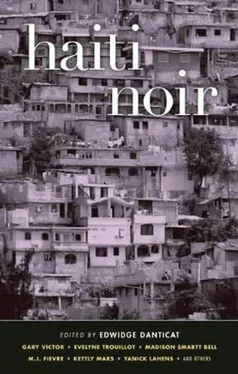After a month of this, I couldn’t take it anymore.
Which is why I lied to get this job. That, and the fact that bankruptcy is staring me in the face. And I have no idea how I’ll make it through this week.
The news is bad. Haiti is suffering the worst drought in years. The rainy season is months away, yet people still pray for a miracle. Haiti’s floods are as violent as its politics, sweeping away entire villages. What used to be forest is now something more like a desert. There’s a Haitian proverb for hard, brutal rain during bright sunshine. The devil is beating his mother. Grandmère Lucille explained that one for me. The sunshine is the devil laughing, and the raindrops are his mother’s tears.
You’d think with all this humidity there would be rain. I seem to be sweating more than I ever have in my life. I scan the airport departure lounge for a ceiling fan because the airconditioning, if it ever existed, is kaput. Where the hell is Miranda Wolcott? Her flight landed an hour go. I’ve left three messages on her cell. Customs wouldn’t hold her up that long. The way things are going, we’ll miss the last flight today. Driving to Cap Haitien is out, thanks to illegal roadblocks and gangs that specialize in trailing cars from the airport to rob them at gunpoint. Or kidnap the people and hold them for ransom. I’m glad we have security.
I ask Manuel if we’ll really manage to do everything on the itinerary. He’s an agronomist and the program manager at Plant for Peace. Nice guy from what I can tell so far. The three of us will fly north, via Aérogare Guy Malary, to meet Alexis Auguste, the director, and visit some co-ops. Then we’ll drive to the border to meet a few farmers before we head to the Central Plateau to the training center in Papay. Manuel tells me not to worry. His eyes seem genuinely calm as he pats my hand. I’ve seen that kind of look before, mainly on blissed-out Buddhists and born-again Christians. Actually, he looks a bit like my older brother Philippe, the one my mother worships. The Saint of Our Family. Youngest partner in his law firm who works pro bono for Haitian detainees. The only thing he can’t do is walk on water. Too bad I can’t stand his Polish wife.
“On the last day, we leave at dawn,” Manuel says.
“Why are we missing the big march?” It doesn’t make any sense to me, until Manuel gives me a tight smile and changes the subject. My guess is someone doesn’t want the march to happen, and Manuel is expecting trouble. I don’t really want to know more. Politics has never been my thing.
I’m sitting right under a ceiling fan to cool off and look halfway presentable when Miranda finally shows up. Maybe I should use this time to rehearse my script. Did she read any of the books I suggested? Did she watch The Comedians? Okay, so it was filmed in Africa, but Graham Greene got a lot of details right. Nearly fifty years later, the airport’s murals and the earnest slogans could be the same, except for the face of the president. The tarmac is still pockmarked asphalt that shimmers in the heat. The mountains are dusty from erosion. Men dressed in starched white shirts wait outside the airport terminal, dreaming of departure.
Miranda first told my boss that she wanted to “see some real voodoo.” Vodou , I corrected her by e-mail. What did I really know about it? The last time I was here, I was just a girl. “Baby Doc” had recently been exiled, and people were hopeful about the future. My family decided it was safe again to visit.
Despite Haiti’s tragic history, or perhaps because of it, we were always proud of where we came from. The world’s first black republic. The second republic in the New World, after the U.S. The first country created from a successful slave revolution in 1804, boycotted for decades should any other slaves get the same idea.
Back then, when we arrived at the airport, a smiling crowd of black and brown faces lined the balcony overlooking the tarmac, waving as we disembarked and made the long hot walk to the terminal. I thought the crowd was there just for us, filled with our relatives who wanted to welcome us back. This must be what it feels like to be home.
Politics and Vodou were all most people knew about Haiti in those days, and they were both steeped in blood. The politics were the reason my parents had left and couldn’t go back. One uncle was assassinated, another thrown in jail for a year. More than that they wouldn’t say.
They didn’t talk much about Vodou either, since we were raised as Catholics (although my father only went to church on Christmas Eve and Easter). My mother did tell me some stories, but just as I’d get all caught up in it and suspend my disbelief, she’d let me down with: “Of course, it’s all nonsense.” For months before our family trip to Haiti, I’d been begging my parents to let us attend a Vodou ceremony because I thought it would be a cool thing to tell my friends. So they finally relented. I’d been looking forward to that night for a long time. We all went together, with Philippe on one side of me and my mother on the other.
The Vodou priest, Monsieur Duval, began by explaining that this was a real ceremony, and that we should forget most of what we’d heard or seen in the movies.
“I will not stick any pins into any dolls,” he said smiling, “and if you behave, I won’t turn anyone into a zombie.”
I rolled my eyes when the crowd laughed. The drummers began slowly. From the left of the amphitheater came a single file of men and women dressed in white, doing a two-step meringue shuffle to the beat of the drum. Duval picked up a bottle from his altar. He took a swig and sprayed it out into the air.
“Do you think it’s rum?” Philippe’s eyes were bright with excitement.
“I think it’s gross.”
Monsieur Duval was tall, with the broad-muscled shoulders of an athlete and smooth caramel skin. He would have looked just as good in a designer suit as in the white robe of the ougan. He probably still had some business suits from his days as a chemical engineer, before his father summoned him back to Haiti to assume the mantle. My parents knew him as a student in Paris, where he was a real bon vivant, popular with the French girls he took dancing to all the best jazz clubs.
The believers were now in the middle of the room, chanting and clapping between the drumbeats. Their luminous faces seemed even darker in the candlelight. Duval pointed to one of the complicated line drawings on the dirt floor. To me it looked like a cross standing on a coffin. “These are vèvès, which we draw with cornmeal and wood ash. Each lwa has his or her own.”
A murmur rippled through the crowd. Duval set fire to a small pile of twigs near the vèvès. The smoke snaked along the poto mitan, the middle post holding up the temple. Grandmère Lucille would always say women were the poto mitan of the world. Then one day I asked her why all the priests at our church were men. Her face lit up and she hugged me tight, like she was proud of me.
Duval closed his eyes and muttered a few words while the believers circled him, still doing that two-step. The hypnotic chanting became a call-and-response, lulling me to the edge of sleep. I rubbed my eyes and opened them wide.
“Look at that!” I cried out, and my mother hushed me.
A woman had stopped right in front of us. She had the darkest skin I’d ever seen, a kind of midnight-blue, and her arms and legs were trembling in spasms. She threw back her head and screamed. I grabbed my brother’s arm. No way would I let my mother see me get scared.
“What’s happening?” I whispered to Philippe.
“She’s possessed, in a trance.”
I glanced at my mother and her expression of calm bemusement.
Now the woman was bent over, still shaking, lunging toward Duval. She grabbed his bottle from the floor and drank from it. We all gasped when we heard the sound of glass breaking and saw her chewing.
Читать дальше












